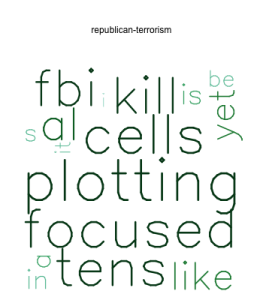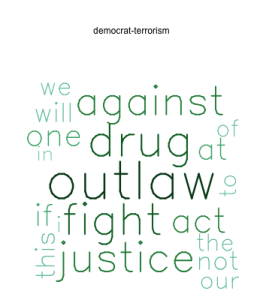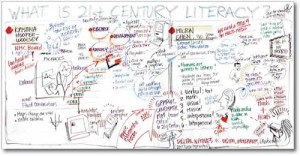 Podcasts, blogs, websites, Kickstarter video pitches and proposals, even T-shirts, shoes, and dance: all of these are ripe and potentially rewarding media for undergraduates to take ownership of their writing. Join us for a DH Kitchen on Friday, October 2, 2015 at 3:00 p.m. in Reynolda 301. Drawing on best practices in pedagogical literature and their teaching experiences, Writing Program teaching professors Jimmy Butts and Laura Giovanelli will outline why current research makes an argument for multimodal writing—anything that isn’t solely alphabetic text—and how to begin creating such assignments in your classrooms.
Podcasts, blogs, websites, Kickstarter video pitches and proposals, even T-shirts, shoes, and dance: all of these are ripe and potentially rewarding media for undergraduates to take ownership of their writing. Join us for a DH Kitchen on Friday, October 2, 2015 at 3:00 p.m. in Reynolda 301. Drawing on best practices in pedagogical literature and their teaching experiences, Writing Program teaching professors Jimmy Butts and Laura Giovanelli will outline why current research makes an argument for multimodal writing—anything that isn’t solely alphabetic text—and how to begin creating such assignments in your classrooms.
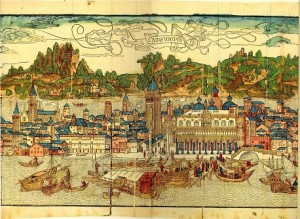 Join us for a DH Kitchen on Friday, September 11 at 3:00 p.m. in Reynolda 301. Monique O’Connell will discuss her experience designing and building the Rulers of Venice, an online searchable database of election registers of the Venetian Republic in the medieval period. By offering new ways of searching these election registers, the database allows us to gain a more complete picture of officeholding in medieval Venice and also significantly reduces wear-and-tear on the fragile election registers themselves. Beyond its specific contribution to the field of Venetian history, the project’s development over the course of the last 15 years offers an interesting case study in the challenges of ongoing DH projects, raising issues of maintenance and stewardship that we don’t usually consider. An associated book of interpretive essays — The Rulers of Venice, 1332-1524: Interpretations, Methods, Database — was among the first humanities e-books published by the American Council of Learned Societies, in 2009. A recent second release reflects upon the project five years out. Recently, Monique partnered with ZSR Library’s Geoff Groberg to migrate the database underlying the Rulers of Venice project to a more sustainable platform.
Join us for a DH Kitchen on Friday, September 11 at 3:00 p.m. in Reynolda 301. Monique O’Connell will discuss her experience designing and building the Rulers of Venice, an online searchable database of election registers of the Venetian Republic in the medieval period. By offering new ways of searching these election registers, the database allows us to gain a more complete picture of officeholding in medieval Venice and also significantly reduces wear-and-tear on the fragile election registers themselves. Beyond its specific contribution to the field of Venetian history, the project’s development over the course of the last 15 years offers an interesting case study in the challenges of ongoing DH projects, raising issues of maintenance and stewardship that we don’t usually consider. An associated book of interpretive essays — The Rulers of Venice, 1332-1524: Interpretations, Methods, Database — was among the first humanities e-books published by the American Council of Learned Societies, in 2009. A recent second release reflects upon the project five years out. Recently, Monique partnered with ZSR Library’s Geoff Groberg to migrate the database underlying the Rulers of Venice project to a more sustainable platform.
WHO: Wesley Hogan, Director of Duke University’s Center for Documentary Studies
WHAT: How does contemporary art reflect archival and activist contexts? Art, Archive and The Movement.
WHEN: Thursday, May 14, 6:00–8:00 p.m.
WHERE: SECCA
As part of the Talk @ SECCA series, which focuses this year on how artists and scholars invoke alternative modernisms, Wesley Hogan will discuss how artists use archives to call upon collective memory and awaken public imagination, with a focus on the photographs of Leslie Hewitt and images of American Civil Rights. Free and open to the public.
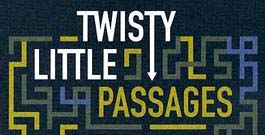 Join us on Friday, April 10 at 2:00 p.m. in Reynolda 301 for a DH Speaker Series talk. Mark Sample (Associate Professor of Digital Studies at Davidson College) will give a talk titled “A Maze of Twisty Little Passages: From Bits to Books and Back Again.”
Join us on Friday, April 10 at 2:00 p.m. in Reynolda 301 for a DH Speaker Series talk. Mark Sample (Associate Professor of Digital Studies at Davidson College) will give a talk titled “A Maze of Twisty Little Passages: From Bits to Books and Back Again.”
Mark Sample is, in his own words, a “literary scholar whose study of recent American fiction led him to the digital world, where contemporary artists and writers are on the vanguard of experimental literature.” His work includes, among other publications, an examination of the representation of torture in video (Game Studies, 2008) and a critique of the digital humanities’ approach to contemporary literature (Debates in the Digital Humanities, 2012). In 2013, he left his post as Associate Professor of English at George Mason University College to lead Digital Studies at Davidson College.
The DH Speaker Series features presentations about particular DH projects by WFU faculty and students and campus guests. Watch for announcements about upcoming talks.
We hope to see you there!
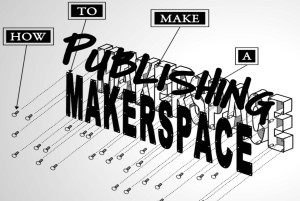 Join us for a DH Kitchen on Tuesday, March 17 at 4:00 in Reynolda 301. Led by David Phillips and Chelcie Juliet Rowell, the session will focus on retooling and redefining scholarly publishing. After a brief introduction to the Publishing Makerspace concept—a model that draws from the recent genre of Makerspace practices in engineering workshops, libraries, and online communities—we will brainstorm about the future of scholarly publishing by participating in a guided visioning exercise called a charrette, an approach to visioning and modeling that originated in the design disciplines. You can expect a fun and lively process with potentially surprising and inspiring results that might change how you approach your own research and writing.
Join us for a DH Kitchen on Tuesday, March 17 at 4:00 in Reynolda 301. Led by David Phillips and Chelcie Juliet Rowell, the session will focus on retooling and redefining scholarly publishing. After a brief introduction to the Publishing Makerspace concept—a model that draws from the recent genre of Makerspace practices in engineering workshops, libraries, and online communities—we will brainstorm about the future of scholarly publishing by participating in a guided visioning exercise called a charrette, an approach to visioning and modeling that originated in the design disciplines. You can expect a fun and lively process with potentially surprising and inspiring results that might change how you approach your own research and writing.
To participate in the charrette, please come to the session open to considering the following questions:
- What would your work look like if you were free from the professional constraints and norms of your academic discipline (e.g., monograph for tenure or articles in peer-reviewed journals)? In other words, what shape might your scholarly work take if you could be free to express your ideas and share your work in a variety of ways that extend beyond traditional written forms of scholarship? What digital formats would you like to explore that could potentially expand the scope of your work and enable new forms of audience engagement with your scholarship
- What do you wish scholarly publishing would look like in 2030? What contribution might you envision making that would help lead innovation and change that would both further your research objectives and enable you to expose broader audiences to your work?
Learn more at the Publishing Makerspace website. Resources for the March 17 DH Kitchen are available below:
- Slides [PDF]
- Design Charrette [PDF]
- Publishing Makerspace: An Introduction [PDF]
We had a great DH Kitchen session today. Thanks to everyone for coming. As promised I’ve made the slides from the session and the relevant data available here.
DH Kitchen – Data mining and text analysis – materials
I’ve also included the Project-pipeline-questionnaire to get you started on your text analysis projects. I hope that this questionnaire will provide an understanding of the step-by-step process that is typically followed in text analysis projects, but also to give you the vocabulary to discuss the requirements of your project and seek out help and identify relevant resources to conduct your research.
And for fun. Here are the word cloud plots (done in R) for collocations with the words ‘terrorism’ and ‘terrorist’ in the Republican and Democratic State of the Union speeches from 1945 to 2009.
Update: I’ve posted a blog entry on web scraping in R that acquires the data used in this DH Kitchen.
WHAT: Tour of Wake Forest’s Digital Media & Robotics Lab
WHEN: Tuesday, February 17 at 3:30 PM
WHERE: Basement of Manchester Hall
WHO: Sponsored by the ZSR Library Staff Development Committee; tour led by Paul Whitener of Campus IS
Blurb from the PDC event:
The Staff Development Committee invites you to tour the Wake Forest Digital Media and Robotics Lab in the basement of Manchester Hall. The tour will be next Tuesday, February 17th at 3:30 and will be led by Paul Whitener, a UNIX System’s Architect for IS.
The lab includes a 3D printer which I’m told we’ll get to see in action. I doubt the tour will take a full hour, but if you’ve never seen this part of campus, I’m sure it will be interesting and informative.
Sign up via the Professional Development Center.
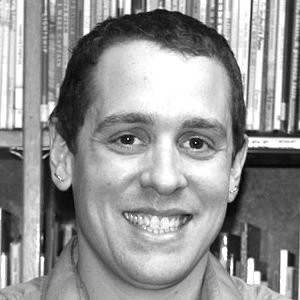 Join us on February 13 at 2:30 p.m. in Reynolda 301 for the first DH Speaker Series event of 2015. Ryan Shaw (Assistant Professor of Information & Library Science at UNC-Chapel Hill) will give a talk titled “Sorry Things Are Such a Mess: Computational Text Analysis in Practice.”
Join us on February 13 at 2:30 p.m. in Reynolda 301 for the first DH Speaker Series event of 2015. Ryan Shaw (Assistant Professor of Information & Library Science at UNC-Chapel Hill) will give a talk titled “Sorry Things Are Such a Mess: Computational Text Analysis in Practice.”
Once a tool for the select few with access to massive computing clusters and skilled programmers, computational text analysis is now something that the individual scholar can do on her laptop with the help of some open-source tools. Yet getting started with computational text analysis can still be difficult. Tutorials on how to use the software tools are invaluable, but because they necessarily use ‘tidy’ examples they can present a distorted view of what is involved with getting an actual project off the ground. At the other extreme, presentations of successful text analysis projects impress audiences with clever interpretations and beautiful visualizations, yet can leave them wondering how exactly one gets from here to there. Hence this talk will attempt to find a middle ground, by presenting a ‘warts-and-all’ account of an ongoing effort to computationally analyze text transcripts of interviews from the Southern Oral History Program’s ‘Long Civil Rights Movement’ project. Ryan will explain the motivation for the project, what he thought he would be doing, and what he actually did, including all the false starts, dead ends, and bad ideas, as well as the occasional success.
Learn more about Ryan at his website, aeshin.org.
The 18th-Century Common offers a public space for sharing the research of scholars who study eighteenth-century cultures with nonacademic readers. We present short accounts of scholarly research in accessible, non-specialized language, along with links to original texts, objects, and images, as well as resources for further reading.
Jessica Richard is Associate Professor of English. Her Ph.D. is from Princeton and her B.A. from Goucher College. She specializes in eighteenth-century British fiction. She is the author of The Romance of Gambling in the Eighteenth-Century British Novel (Palgrave, 2011) and editor of Samuel Johnson’s The History of Rasselas, Prince of Abyssinia (Broadview 2008). She has published articles on gambling in eighteenth-century British culture, Jane Austen, Samuel Johnson, and polar exploration. Her current book project is on alternative forms of education in eighteenth-century British culture. She is the co-founder and co-editor of The 18th-Century Common, a public humanities web project sponsored by the WFU Humanities Institute.
Our goal
The DH Community is a program of Wake Forest's Humanities Institute. We are faculty from across campus interested in investigating the emergence of digital humanities as a field of study, and its relevance and usefulness as a research and teaching tool in the humanities.Join the conversation!
Use your Wake Forest username and password to login and contribute to DH Talk.
Tag Cloud
administration advocacy alan liu Alan Turing Artificial Intelligence big data careers close reading crowdsourcing database design digital curation digital pedagogy digital projects digital scholarship digitization distant reading funding hastac history internet italy language liberal arts media collections methods multimedia multimodal net neutrality pedagogy peer review quantitative analysis resource resources science sentiment analysis southern history statistics symposium teaching textual analysis THATCamp transcription undergraduate education venice word frequency
